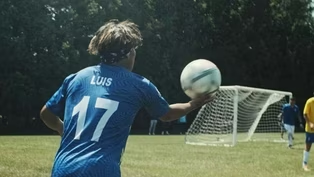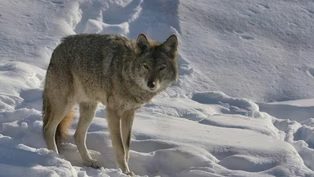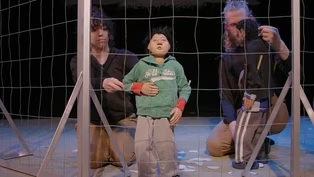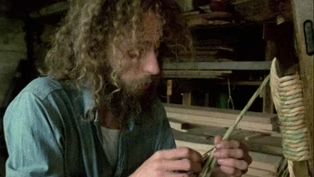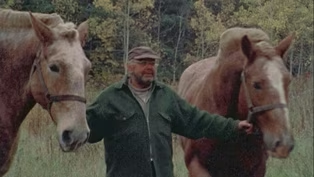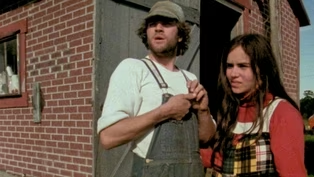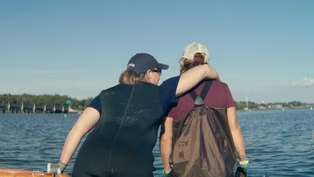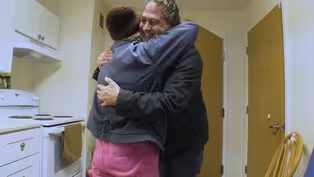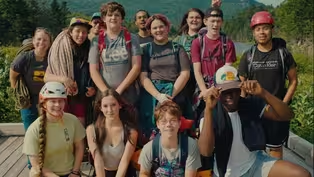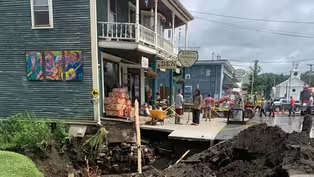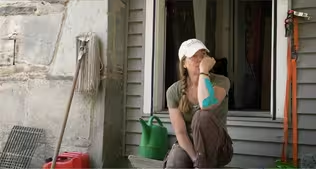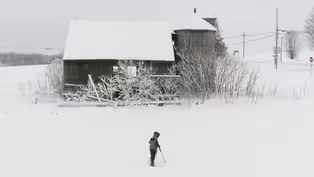Made Here
Braiding A New Life
Season 22 Episode 1 | 37m 33sVideo has Closed Captions
A portrait of a Ghanaian woman as she navigates life in Brattleboro, VT.
A portrait of Sarah, a Ghanaian woman as she navigates life in Brattleboro, VT. Sarah learns to drive with support from the Community Asylum Seekers Project (CASP) volunteers, braids her friend Dora’s hair, chats on the local radio station, listens to a local Congolese refugee band, and takes a roadtrip to buy groceries at an African market.
Problems playing video? | Closed Captioning Feedback
Problems playing video? | Closed Captioning Feedback
Made Here is a local public television program presented by Vermont Public
Sponsored in part by the John M. Bissell Foundation, Inc. and the Vermont Arts Council| Learn about the Made Here Fund
Made Here
Braiding A New Life
Season 22 Episode 1 | 37m 33sVideo has Closed Captions
A portrait of Sarah, a Ghanaian woman as she navigates life in Brattleboro, VT. Sarah learns to drive with support from the Community Asylum Seekers Project (CASP) volunteers, braids her friend Dora’s hair, chats on the local radio station, listens to a local Congolese refugee band, and takes a roadtrip to buy groceries at an African market.
Problems playing video? | Closed Captioning Feedback
How to Watch Made Here
Made Here is available to stream on pbs.org and the free PBS App, available on iPhone, Apple TV, Android TV, Android smartphones, Amazon Fire TV, Amazon Fire Tablet, Roku, Samsung Smart TV, and Vizio.
Providing Support for PBS.org
Learn Moreabout PBS online sponsorshipMore from This Collection
Encounter diverse perspectives on a range of public affairs topics and contemporary social issues.
Video has Closed Captions
In Vermont, soccer leagues forge connection for the migrant dairy farmworker community. (25m 58s)
Video has Closed Captions
Investigating the eastern coyote hunting controversy in Vermont. (38m 6s)
Video has Closed Captions
BABYLON evokes refugee storytelling through puppet, actors and song. (1h 3m)
Video has Closed Captions
Peter Murray (1975) profiles a traditional furniture maker in Charleston, Vermont. (53m 51s)
Vermont People: Chester Grimes
Video has Closed Captions
A 1971 story of a 70-year-old logger in northern Vermont still working with his team of horses. (32m 2s)
Vermont People: Peter and Jane Flint
Video has Closed Captions
A young couple in Wolcott, Vermont in their first year running a small dairy farm. (1h 48m 5s)
Video has Closed Captions
In New Hampshire’s small fishing and aquaculture industries, women have broken down barriers. (45m 31s)
Building Hope: Ending Homelessness
Video has Closed Captions
Puts a face on the unhoused in Maine and tells us it could happen to anyone (57m 43s)
Video has Closed Captions
Teenagers spend a week making friends, rock climbing, and pondering the future in New Hampshire (35m 49s)
Harry's - One Vermont Community and the Flood of 2023
Video has Closed Captions
Harry's Hardware in Cabot, Vermont and the flood of July 2023. (19m 45s)
Video has Closed Captions
A story of the July 2023 Vermont floods that devastated a street but not the community spirit. (37m 21s)
Vanish - Disappearing Icons of a Rural America
Video has Closed Captions
Vanish chronicles the "visual preservation" adventures of photographer Jim Westphalen. (1h 18m 15s)
Providing Support for PBS.org
Learn Moreabout PBS online sponsorship-- Hi, I'm.
-- Eric Ford for Made Here.
-- Braiding A New Life.
-- From Guilford, Vermont -- filmmakers.
-- Willow O'Farrell and Brad.
--Heck is a portrait of Sarah, --a Ghanian woman -- who is navigating.
-- Life in Brattleboro.
-- We are with Sarah and -her.
- Daily life in Vermont.
-As she learns to drive -!braids, her friend -Dora's hair -- chats on the local.
-- Radio station, -!listens to a Congolese -refugee -- band, and visits.
-- An African market.
-- This film was supported.
-- By the Media fund.
-- You can watch.
-- Braiding a New Life -- and other great made here.
-- Films -- streaming on our -!website.
- And through the PBS -app.
-- Enjoy the film.
-- And thanks for watching.
-- Hi Liv!
-- Hey, Sarah.
How are you?
-- I'm good.
-- How are you doing?
-- Good.
Thank you.
-- You look gorgeous.
-- Thank you, so do you.
--So, you know, you have -court on the 14th, -so we're doing our follow up -prep session.
-So I'm going to pretend -to be your attorney -and then I'll pretend to -be the DHS attorney.
-and then we're going -to go over a little -!how to work with the interpreter -in the court system.
-!- Sounds good.
- Okay, perfect.
-Ok, let's get started.
-!All right.
What is your name?
-- Sarah.
-- When were you born?
-- Born?
-I'm born in Ghana.
Kumasi.
-- When?
Like your birthday?
-When were you born?
-- I'm born in Ghana, Kumasi.
-On August 12, 1988.
-!- So youre a citizen of Ghana?
-- Yes.
-- Why did you come -to the United States?
-- I came here -to seek protection.
-!- So I am the Executive Director -of the Community Asylum -Seekers Project, or CASP -Which is a nonprofit, -located in southern Vermont.
-!And we provide social services -and legal services -to asylum seekers.
-And it's funny, though, -because when I started, -I would wear like this -blouse to the office, -just like a normal blouse, -from Anne Taylor.
-And they were like, - "that's so fashionable.
-I'm like, this is an office.
-Like, what am I -supposed.
to wear to work?
-It's very Vermont, -like people are like -in leggings -and a sweatshirt.
-Yeah.
-!I mean, -you know, my my family, -I come -from a family of -immigrants, -and I was not born in the US.
-and I think being a white -immigrant really has shaped -the way I view this work, -because it is just, -such a different - like I'm -not immediately identifiable -as an immigrant, -although I was on the bus -!the other day and I was talking -to one of our clients, in -!Spanish, and the man behind me -told me "to go back to my -country.
-And I turned around.I was -like, "Germany or Ukraine?
-And he was like, - "you were speaking Spanish!
-And I was like, - "people can learn multiple -languages.
-Like, yes, -- [INAUDIBLE] told me that -she was born in Mexico.
-[INAUDIBLE] -- And then she does like -- princess kind of thing.
-!- KATE: And so I first met Sarah -when Community Asylum -Seekers Project -got a call from a pastor, -a Dominican pastor, -in Plattsburgh, New York.
-I remember him saying to me -!on the phone, "Sarah is special.
-And that ended up, you -know, being very, very true.
-And Sarah is special.
-And Sarah is also not unique.
-She has an arrival story, -that is common -in it's tenacity -and common -in its number of maddening -and cruel obstacles -that have come up for her.
-So she, -had essentially gotten -stuck in Plattsburgh, -gotten to know -this man at his church, -and he called around -to all of the asylum -support organizations -he could find.
-And we said, "yes.
-You know, she had been in the -States, for a while at that -point.
-She had crossed the border.
-She had gotten -stuck in detention.
-She had been moved to a -different detention center, -making friends and allies, -and solidarity networks -at every step of the way.
-!- Dora, guess what!
I saw Paula.
-!Paula doing video on TikTok.
-- Who's Paula?
-!- Paula, the one who steal onion -and cabbage in her pants!
-- Oh yeah, with the salad?
-She's with the onion salad!
-- Yes, with the onions -in her pants in detention.
-- And then officer -check her and say, -!
"What is here?
Pull it down!"
-You put the salad and onion, -they put!
-- Oh the Paula from -when you were in detention!
-- Yeah, when I saw her -live on Tik Tok -when I saw her I -started laughing!
-- You know -funny people like that -they survive the detention.
-- Yeah.
Yeah -- Just imagine, that place -smell of onion already!
-!Do you have to put onion there?
-That woman make me laugh!
-- Mine doesn't smell -like onion, O!
-- DORA: So, when I met her -for the first time, -I was happy to see -another African in Vermont.
-Yes.
-So for me, she wasn't only -the asylum seeker -I worked with at CASP -She became like a sister -for me.
-Yes.
I saw an innocent -young lady -not knowing where to go, -what to do, and -and I knew how hard it is -really to manage -life here by yourself.
-!Normally, she don't like gel, -!but I like it to make the hair s -Dora don't like it to -be attached with her hair -but this, the most thing -salons are using -in Ohio, some places I know.
-But she don't like it!
-It's good!
-It makes the hair beautiful.
-Hello, Miss Dora!
-- Hi, hi Sarah!
-When did you come back?
-- Oh!
[inaudible] -- I love this -This was really from Kate... -from New York.
-- New York.
-!So, do you know what I can do?
-Um, I'm gonna do this.
-Which color do you prefer?
-Very beautiful.
-Which one do you prefer?
-- I don't know -- This one, this two of them -is almost equal.
-So, when they come together, -it's good -Then this one will -be on the top, finally.
-- Sarah, I don't want to see -on my head, three colors -- They call it layers!
-Layers mean no one color.
-I will put other color -when I put it on top.
-- Sarah, I'll look crazy.
-!- No no no it will not be crazy!
-- Sarah, are you going to -braid all three packages?
-- You said that you -don't want it too big -like the way I used to -do for you.
-!- My head will gonna be heavy!
-- No!
It's not too much -!- Then you are right to mix it -Yeah...Even in my culture, -we do like... -Yeah, good things really -are like costly -Beauty costs!
-I don't know why -I did not do journalism, -but I love... -It's a dream I have -to have like a podcast -Do like um... -community connection -My first trip to Vermont -was 2007.
-!There's an event that happened -here in summer -- Mm-hm -- Where there is -parade downtown.
-- Mm-hm -- So my first time to see -cows doing parade -- Really?!
-- In Vermont!
-I laughed!
I say, What?!
-It reminds me of Africa -!Because I never knew that here, -Running in the streets, -- That would be funny!
-- ...making parade -- I came, um, -I didn't even know, -we have a state -called Vermont here -I know, God will not -come down to help me, Sarah.
-This, this, this... -!He pass through an organization -that they helped me to come, -which is, I know -you're gonna laugh, -I don't know how to -pronounce it well, -CAPS -- CASP -- Caps -- CASP -- CASP!
-- What challenges -you the most in, -in Vermont, especially?
-- The challenges I'm facing -about, uh...rides.
-Yeah.
-- Vermont really -public transportation... -- Transportation.
-If you know how to drive, -that one will be help you!
-Like me - if you don't -know how to drive, - -- Yeah -- I thought you were -learning how to drive.
-- I'm into it, -!but when we entered this winter, -I called Mr. Bert -I said hey, the snow -is gonna fall!
-- This is not a -good time to do driving.
-- Yeah.
-He said, it's gonna snow, -it's gonna fall -!As soon as he said, he told me, -within 30 or 45 minutes -I see my window, -it's falling like rain!
-I said, look at this snow!
-Why you want to spoil my day?
-- So cars had like.
-- 300 volunteers.
-- For asylum seekers, knowing -!how to drive is very important.
-So, CASP, it has like -300 volunteers.
-So we reach out -to volunteers -who were willing to provide, -like driving lessons.
-- Hello!
-- Hey!
-- Are you ready for a - -- I'm good!
How was work?
-- Driving?
Ok!
-- But you have to assume, -any place you are, -that there could be a -car coming the other way too.
-You always stay on the right.
-Yeah -How about in Ghana?
-It's on the right, right?
-Is it on the right?
-- So the situation I am, -I was like a--a--- -what do you call it?
-Umm -!Do I even notice those things?
-Because I never dreamed -!that I would have a car, before!
-- Oh yeah -- My life was something-- -just --struggle life!
-- Right.
-- Never even think that -I will drive someday -Or have a car someday.
-- I let this one go first -because I got there second.
-- Okay -!- See, it's a stop all around.
-Oh -All ways.
So you take turns.
-- uh-huh -- Whoever gets there first -should be the one to go first -- Go first.
Oh okay.
-You don't have to -in a hurry pass by -!Or, you - you - try to overtake!
-- No, no, no -!- In Africa, they like overtakin -- No, no competition -- I'm gonna make it -!like you're getting in the car -for the first time.
-!Turn it off, put on the brake.
-- Okay.
-- Just cuz it's good -practice for you.
-- Mm-hm -!- Yeah, you're good on that now.
-!You can feel a little bit of gas -Okay, we're good.
-- Mm-hm -I can also go straight -to the bank or no?
-- But - See, Do Not Enter.
-- Okay [Laughs] -- Yeah - there's a one-way.
-Yeah -Oo!
Oo!
Oo!
[Laughs] -Whoa whoa whoa!
-[Inaudible talking] -Stop at the corner -- You know what?
-!She has renewed that license - -learner's permit - twice -or three times -- No, not-!
-- Get your license!
-Wait till I answer.
-- No, I'm talking about the -learner one, which expired -they said I should let-- -- Nobody renew -learner's permit, O!
-- Really?
-- Do driver's test.
-- She can't really -do the test yet -- Since I don't know how - -!- That's so diplomatic Willow - -Willow's like, mm, -I don't think, mm -!- But Scott said I can do it!
-Scott said I can do it, Liv!
-!- Willow!
I don't encourage her -to keep renewing and renewing -!You better learn how to drive, -Sarah!
-- Then who is gonna -continue now?
-Bert is done with me.
-!- Sarah!
Don't pull me so much -!- It's not pull, look!
Just that -It's not pulling -- My head is really soft -!- I know, I know.
I didn't hurt -But definitely, you can't -do hair, you not feel it -You'll feel a little bit -- Ow!
You know... -- Oh my god -- Yeah -!Sarah, do you see how my hair -is all gray hair?
-- No -- I didn't even color it -I had the color, -but I didn't have time.
-You know how you get home -you are so exhausted -- So... -- So, tell me about -The hairstyle that -you're gonna make -- This hairstyle?
-- Yeah -- You reduce my rice -a little bit more.
-Please.
-- I'm talking about hair, -you're talking about rice.
-- Yeah -(Laughs) -Yeah, it is a hairstyle -This hairstyle, -we call it rasta in Africa -- Oh yeah yeah yeah -- Yeah, but America, -they don't know rasta!
-Rasta is Bob Marley -They call Bob Marley "rasta" -- Yeah -They don't know about -the hairstyle we call rasta -- Yeah.
-- Yeah, so, yeah -In my country, -!they call it "rasta tres fait" -When they are -small-small, small ones -- Mm -- Yeah -- Sarah, please -- It's not tight -- Yeah it is!
-- No!
-- Mm-hm -- You see?
It's shaking, -if something is tight, -it cannot hold -You see the down.
It's soft.
-That is I'm no... -!I'm not tightening it...too much -- What are you cooking?
-It smells good.
-- Yeah, I looked at it, -there's a... -Uh...What do you call it?
-A sardine -What do you call it -here in America?
-- Sardine -- Yeah, because, uh, tatos - -when I mentioned -they laugh at me, -because I don't know -how to pronounce it.
-I love that one -When you use it for food, -it's good.
-So I remember one day, -one day, and one man -this African, asked me, -!
"Hey, why, young lady, you are -going and stay in Vermont?"
-I see the man, -the way the man is talking, -!I see that Vermont is no good.
-And I say, -why are you saying that?
-"Yeah, it's good, -!but you can't stock on food..." -Yeah, I don't like this -bagel-bagel and those things, -I'm not enjoying it at all -All I want is to -get African shop, -Get my fufu stuffs -Get my smoking fish, -saltfish... -- Aww... -- It takes a long way -to go there, -because you use 45 minutes -or one hour, I think?
-- I think from here -to Springfield, Mass -is 45 minutes drive.
-- Yeah.
Yeah.
-Things that I want to make -my food and be eating -and feel myself, -that you are African, -still you see yourself there.
-Not that you are there, -but you see yourself there -!eating what they are eating ther -You are getting it here.
-I wanted to ask him - -!if it's millet, I will buy it.
-I want millet to make -a porridge in the morning -- Yeah, nice -- But I don't know, -I didn't see millet - -if it is millet, -they will write "millet" -- Yeah -But they might - -- Which one you are -buying for Dora?
-- I'll get this one for Dora -Unless I find a -bigger peanut flour.
-- Sarah, do you -need any of this?
-- No.
No, I have a lot.
-(Sarah and the shopkeeper -speaking Twi and Fante) -- Yeesh!
-Saltfish?
-- It looks like this?
-- Each one has a price.
-!
(Haggling, discussing products) -This is saltfish -Is this the saltfish with -the rough scales?
-- That's why I'm -showing it to you.
-Yeesh!
-- I'm giving you a hard time!
-What is this?
-- Keta Schoolboys -(a kind of small dry fish) -- keta schoolboys, -keta schoolboys... -Is it the salted kind?
-- No it's from Congo -- Oh, it's for Congo people -- Who is preparing a tea?
-John, you?
Are you a British?
-Did you come into the country -with your visa?
-- Let me come and take it.
-Ugh -I think I will take one.
-Yeah.
That's enough.
-- KATE: The determination -of who counts as a refugee -and who counts as an asylee, -which is an asylum seeker -who's been approved, -is largely -a political definition.
-And I think if you look -at the proportions -of who gets asylum -and who doesn't, -who gets refugee status -and who doesn't, -you can kind of draw -the lines of U.S. -interests around the world.
-People often, -you know, mistake this, -but there is no illegal -way to seek asylum.
-People show up at the -!border to save their own lives, -and that's -what they're supposed -to be allowed to do.
-- They arrive at the border, -or the port of entry, -ask for asylum, -you know, flag their fear, -to return home, -and then they're placed -in I.C.E.
detention.
-Some of them are released.
-Some of them have to -bond out.
-So to bond out, -you need a sponsor -that shows -that they can financially, -emotionally, etc., support -you and make sure -that you attend -your legal proceedings.
-And then after that, it's -difficult because you're -Unless you have family -or friends who they're able -to support you, -you're sort of on your own.
-And depending on the state, -!asylum seekers are not eligible -for a lot of benefits -and they're not able to work.
-They can't apply for their -work permit until 150 days -have passed -from filing their -asylum application, -and then they still have -to be processed.
-You have asylum seekers -who can't work for eight, -nine months a year.
-And you know, -!what are people supposed to do -in that situation?
-So people don't realize -that refugees -not to say that their -journey is whatsoever easy, -but that they have -access to, you know, -federally funded case -management and, -you know, relocation, -and like rent etc., -whereas asylum seekers, -have literally nothing.
-It's really up to individuals -and nonprofit organizations -that are not linked -to the federal government to -!provide those services for them.
-That's where CASP comes in.
-We try to, you know, support -those basic needs, -while theyre waiting for -their work permit.
-Ok. Let's say - -the judge is you, asking me, -"How did you get to America?"
-!- So, after Brazil, how did you -I would say, like, "a woman -helped me buy a bus ticket" -"to Peru to help -me escape Brazil. "
-"And then from there -!we went through these countries, -"I got to the -U.S.-Mexican border, --" -- Do you know these people!
-They want to prove/know -that you are really -telling the truth -that you passed through - -they want you to -count through the countries!
-!They did to me in Immigration.
-"How many countries did you -pass before Mexico?"
-I started counting.
-From Peru, Ecuador.
-Ecuador, Colombia.
-Colombia through the forest, -From the forest, Panama -!Panama, Costa Rica.
Costa Rica, -to Nicaragua!
-- I think you can say that -- -- Nicaragua, Honduras.
-Honduras, Guatemala.
-From Guatemala to -Mexico, Tapachula!
-- The fact that the -asylum journey -is so long and arduous -and that there's -no support for people -until they get to a place -like Brattleboro, -means that it can be -very, very difficult to build -a case as legally robust -as is required.
-Sarah traveled from Ghana, -where her life -was in danger, to Brazil, -where she was trafficked -for labor, -to the United States.
-She essentially went -from Brazil -to the United States on foot, -with some bus trips.
-You know.
-Can you imagine along the way -bringing a dossier -of paperwork to justify -your asylum case?
-You'd - you know, she didn't -have a camera, right?
-She didn't have a -recording device.
-There were some things -that Sarah had in her pocket, -when she was crossing -various rivers -on her way from South America -to the U.S borders, -that were damaged by water.
-You know, you lose stuff.
-And and the journey -!doesn't translate automatically -to the court room.
-And so, you know, -if Sarah's case is denied, -does it mean that she didn't -have a robust case?
-Does it mean that she -doesn't deserve asylum?
No.
-Okay, so let's ask again.
-So I'm the DHS attorney -!You might have a nice attorney -You might have a -mean attorney so -I'm going to go in the middle -and see -- I got you -It's good to open my mind -- You were in Brazil -for how long?
-- For two years -- So in two years you never -!asked for asylum in Brazil, why?
-- Why?
I don't go out.
-- What do you mean -you mean you don't go out?
-- I don't go out because -they know, if I go out, I may -I may met somebody -!who can understand my language -the English that -I can express myself to -- Why does that matter?
-- It matter that, um -I have no - I have no anyone -to talk to as a friend -that I can explain -what I'm passing through.
-Open up to someone, -!open up what I'm going through -to someone -Because if I'm able -to have a friend, -I can sit the friend down -and tell, hey, -!this is what I'm passing through -I need to seek asylum.
-- And so at this point, -the attorney would say, -!
"Judge, this is not responsive."
-- Okay -- You're not answering the -question that they asked -well, let's try it again.
-Why do you feel -you were trafficked?
-- I didn't know the language!
-I don't speak Portuguese.
-I don't have friends.
-So who am I going to answer - -- But also you were being -held against your will.
-- You are making asylum -as if it's a social event!
-- But, that's most -people's answer.
-!- You don't know the language, -you don't have any friends.
-That's why you didn't -seek asylum in Brazil?
-!They made me work in the salon -from morning to evening -- to night!
-- without feeding me -- Yes!
-!- without me talking to anybody -- Without me having -access to my documents -- Not even going outside -!And they even kept my passport.
-- It's called forced labor.
-- Period!
-- Yeah, period.
-- Because I was working -as a servant!
-Because I was a servant.
-In those two years, -!were you allowed to go outside?
-- No.
-- Short answer, done.
-Boom.
-- What!?
-- Boom.
-- I guess it's just a -question of like, -remembering that the -whole story matters, -!but it doesn't matter to them.
-You know, it matters to us.
-- KATE: Immigrant justice -isn't a question -of fighting for other people.
-It's really a question -of fighting for all of us.
-Whether or not all of us know -that we're going to need -those rights to be protected -in our future, -or our children's futures, -or our grandchildren's -futures.
-- I would hope that -if I were facing something -that was a threat -to my life or my -children's life, -that someone would help me.
-No one wants to leave -their home, their family, -their culture, -unless they really have to.
-And I don't think any of us -would either.
-- My wish is that Americans, -seeing refugees -and asylum seekers -not as a problem.
-Putting a narrative there -that all these people -who come in the country -are illegal, are criminals.
-It creates hate in the other -people's heart and, -and the more -they create fear in people, -the more I don't trust -my neighbor.
-Socially, it is -destroying community -than building community -You know, life is its a, -it's a learning journey.
-Yeah.
That's why I always -say, get to know people, -!visit them, share with them food -This is not your enemy.
-Is your neighbor.
-And so get -to know them, welcome them.
-And I know Vermont, -really are welcoming people.
-Hi everybody -- Hi!
-- You're most welcome and -I'm so grateful to -see you all and -I'm so grateful to be here -!to do all this with my brothers.
-Yeah, it's amazing.
-Yeah, I just lack words -to express how -much I'm so excited -For this is the first show -we're having in -the United States -!and it's happening in Vermont.
-Is this Vermont?
-- Yes!
Yeah!
-I'm so happy that -you're the first audience -to listen to the kind -of music that we play -We come from a country -called DRC Congo, -It's in Africa.
-in hard times you try -to pick up something cool -to keep yourself smiling -and that's why we do -all what we do.
-- DORA: Vermont itself -People in Vermont -are welcoming.
-They are more liberal.
-Yeah.
-So they know, really, that -anybody who comes here -is a new Vermonter -needs community.
-So for me, whenever -I meet a new person, -I always want to know -who the person is.
-And I always invite people -!learn how to know these people.
-!What do they have to teach us?
-It's always integration, -!I always say it's not one way, -its both ways.
-So if you know me, -and I know you, then yeah, -you have to teach me, -and I have to teach you and -what a relationship -is all about.
-- KATE: A borderless world, -I think, has to guide -our vision.
-We have to start -thinking about -!what is the most climatically -stable part of the world -and how can those -parts of the world -do everything they can to -welcome -as many people as possible?
-Vermont has seen -historic flooding -in the last couple of years.
-in the last couple of years.
-You know, -we are getting displaced.
-Our people, -are getting displaced.
-And so as people at the top, -of of the economic pyramid, -hoard, more and more -and more wealth, -and more and more resources, -and more and more safety, -and security -for themselves, -all of us stand to lose, -and all of us stand.
-to be the people in need, -the people who need to move, -you know, -the people who need, -to be allowed to move.
-And the need to cross -a border is a human need.
-It's a need of all life.
-And it's just patently -crazy that we have decided -that we can decide who -gets to save their own lives -and who doesn't.
-- Yeah, this color -is really nice... -Mm-hm -!- When I did the end like that, -If you are losing it, -nobody around that you can... -!You can easily get to loose it.
-That's why-- -Hey-y-y!
-There is a good news -!I said I will tell both of you!
-- Mm-hm?
-!- I don't know if it's good news -or it's something like -funny-good-news -- Yeah?
-- Yesterday I wake up -No, in the night-evening!
-!I see envelope.
Brown envelope -on my door.
-- What is in it?
-- I say, what is in -that envelope for?
-What is it for?
-!Now I'm done with immigration?!
-What is it, this letter for?
-!- You are done with immigration?
-Not yet!
-- Ah, okay -Because they give my paper, -!that's my certificate saying -- -- But working paper is -not asylum, my dear.
-- So, I open it, I say, Ah, -why, why, who's going -to send me this?
-!I see it's not immigration.
Ah!
-Vermont Adult Learning!
-!I see on the paper it was that.
-I open it -- Certificate?
-- "Congratulations for your -'citizenship learning' " -- I wish it could be like, -"Congratulations for you -!becoming an American citizen!"
-- Aww, that's what -I'm tellin you!
-I say, Ah!
What -this thing doing?
-!- It will come, it will come.
-- The certificate is like -when I finished hairdressing -- So - Let me ask you some -question they ask.
-How many states do we -have in the US?
-- How many states do we have?
-- Yeah -- Yeah.
52.
-- Isn't it 53?
-- DORA: She has this talent -of braiding hair -And I used to go to -Springfield, Mass -for hair.
-Drive one hour.
-Sat for hours, -and then come back.
-So it was really, like, -Easy for me -to have her around here -and then whenever, -!yeah, I wanna really do my hair, -she did.
Yeah.. -!- When I get home I will dry it -!- Oh!
I like your mix of color!
-Look at the way it looks.
-The colors -Beautiful -- What is 'Thank You' -n Ghana language?
-- Medaase -- Medaase?
-- Medaase -- Medaase -- Medaase -- Medaase -- For me she's really -like a sister.
-And I love her.
-And... -I'm happy and I hope that -this master hearing, -that she's having.
-Yeah I'm hopeful -that it will come really -successfully and -leave all the stress -and the trauma behind her.
-- Yes.
Dear God -we thank you this morning -for the gift of life.
-Thank you for this journey.
-Thank you for connecting -us with Sarah.
-I want you Lord to show -Sarah that you are with her, -and may her open her mouth -and you speak to the judge.
-May you bless them -when they go, -and when they come back.
-Lord, we want to hear -good news from this.
-You have been with Sarah from -the journey from day one.
-So.
And today, -you are the Lord that see -the end and the beginning.
-So we declare victory.
-We want to hear good news -when they come back.
-May you favor them.
-May you cover them.
-!May your protection be with them -Go ahead of them -and come back with them -with the good news.
-And in Jesus name.
-We pray and believe.
Amen.
-- This is when she finds out -If she'll be able to remain -in this country permanently.
-With an asylum grant.
-So, you know, -she's been waiting -about five, six years -for this moment.
-And, you know, -she's very nervous.
-All of us who work with her -are very nervous for her.
-And we're hopeful -that theyll grant.
-Amen.
-I can see you're -stressed out already.
-- Many, many people -with very meritorious claims -that exactly fit -the letter of the law -are not granted asylum.
-Many, many, many.
-For all the obstacles -that are baked into the process -And it's my hope -that Sarah's story, -I mean, it's my firm belief, -that Sarahs story, -is is what the system -was designed to protect.
-You know.
-She absolutely, -fled her country of origin -to escape persecution -based on membership -in particular social groups, -which is exactly what, -!you know, the asylum system is -designed to protect.
-!- So they're not going to ask -you these questions exactly -like they are.
-And it depends who -the DHS attroney is.
But -DHSs job is to find -holes in your story.
-To prove that, you know, -!you shouldn't be granted asylum, -or that, oh, -this story isn't true.
--Okay.
-!- KATE: You know, concerns are -that the system will work -as I believe -it was designed to work, -which is to exclude people -from safety.
-I hope that they grant her -the asylum that she deserves.
-- And I said No.
-- He said, "If you're gonna -!bring a curse on these Idols?"
-"I don't care if you die.
-I don't care."
-"You are little thing to me.
-I don't care if you die."
-!So that one thing that he means -to do whatever -Even if he kill me.
-He don't care.
-So that thing is in my mind -I was panicked to die -Feared to die -So that's why I said, NO!
-Nobody to help me, -So it depend me and God -How I can escape -!Something is telling my heart, -just run -Don't look back -!I wasn't look back, if somebody -is chasing me, -I just run.
-- So I'm here... -And I'm prepared for them.
-- How are you feeling?
-- I think today I'm... -Ok than a week ago -Or three days ago -My head is blossom -But now -!With you lovely ones around me?
-!I think, oh, that burden is gone -!Now I'm free, I'm okay, I'm okay -No panic, no fear -I feel like...
I'm going -for interview -Like a job interview, -or something -!They're gonna ask me questions, -I need to be answering.
-That's what I feel within me.
-!So my spirit is comfortable now, -not like before, -I used to feel, yeah, -not like yester-night!
-I was not thinking, -but the sleep is not coming!
-I asked myself, why these -eyes are not closing?
-But, I don't know, -maybe I'm thinking -what God has for me... -Why they put my court date -on the 14th?
-Why?
I ask myself.
Why?
-- Yeah!
It's Valentine's Day!
-- Maybe the Judge decided -to put it that way, -to show me love?!
-That's crazy!!
-!- The judge is proposing to you!
-- Do you want some water?
-- Thank you -- I hope -I hope so, yeah
Support for PBS provided by:
Made Here is a local public television program presented by Vermont Public
Sponsored in part by the John M. Bissell Foundation, Inc. and the Vermont Arts Council| Learn about the Made Here Fund
